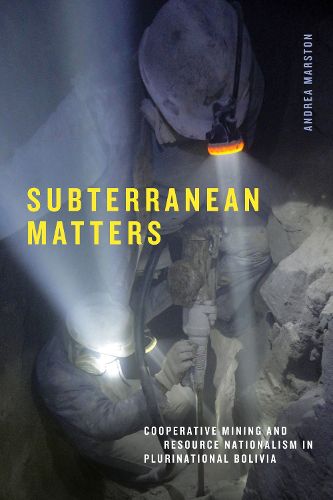Readings Newsletter
Become a Readings Member to make your shopping experience even easier.
Sign in or sign up for free!
You’re not far away from qualifying for FREE standard shipping within Australia
You’ve qualified for FREE standard shipping within Australia
The cart is loading…






In Subterranean Matters, Andrea Marston examines the ongoing history of Bolivian mining cooperatives, an economic formation that has been central to Bolivian politics and to the country's economy. Marston outlines how mining cooperatives occupy a contradictory place in Bolivian politics. They were major backers of left-wing president Evo Morales in 2006 and participated significantly in the crafting of the constitution that would declare Bolivia a plurinational state. At the same time, many Bolivians regard them as thieves because they derive personal profits from the subterranean mineral resources that are the legal inheritance of all Bolivians. Through extensive fieldwork underground in Bolivian cooperative mines, Marston explores how these miners-and the subterranean spaces they occupy-embody the tensions at the heart of Bolivia's plurinational project. Marston shows how a shared feature of left-wing and right-wing politics in Bolivia is a persistent commitment to nation and nationalism, illustrating how bodies, identities, and resources fit into this complex political matrix.
$9.00 standard shipping within Australia
FREE standard shipping within Australia for orders over $100.00
Express & International shipping calculated at checkout
In Subterranean Matters, Andrea Marston examines the ongoing history of Bolivian mining cooperatives, an economic formation that has been central to Bolivian politics and to the country's economy. Marston outlines how mining cooperatives occupy a contradictory place in Bolivian politics. They were major backers of left-wing president Evo Morales in 2006 and participated significantly in the crafting of the constitution that would declare Bolivia a plurinational state. At the same time, many Bolivians regard them as thieves because they derive personal profits from the subterranean mineral resources that are the legal inheritance of all Bolivians. Through extensive fieldwork underground in Bolivian cooperative mines, Marston explores how these miners-and the subterranean spaces they occupy-embody the tensions at the heart of Bolivia's plurinational project. Marston shows how a shared feature of left-wing and right-wing politics in Bolivia is a persistent commitment to nation and nationalism, illustrating how bodies, identities, and resources fit into this complex political matrix.